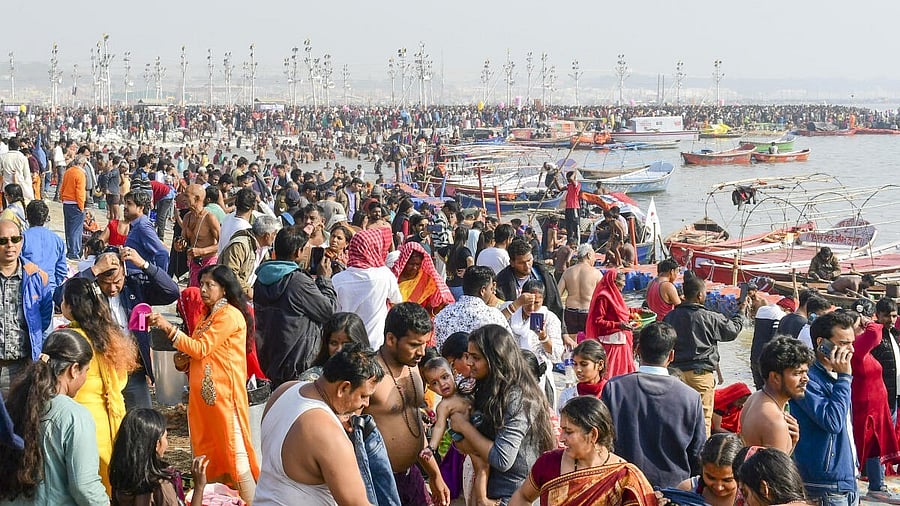
Maha Kumbh Mela 2025.
Credit: PTI File photo
The Maha Kumbh Mela, currently underway in Prayagraj, commenced at Sangam , the confluence of Ganga, Yamuna and the mythical Saraswati rivers on January 13.
'Kalpavas' an ancient spiritual practice is an integral part of Kumbh Mela traditions. 'Kalpavas' finds mention in many ancient texts, including Mahabharata and Ramcharitmanas.
It involves self-purification, devotion and spiritual discipline. The period lasts for a month, however this period is equal to a single day in the life of Lord Brahma.
It is interesting to note that Laurene Powell Jobs, the billionaire widow of Steve Jobs, who was co-founder and former CEO of Apple, attended the Maha Kumbh and observed 'Kalpavas'.
As per Hindu mythology, 'Kalpavas' is an age-old practice rooted in Hindu tradition. The word 'Kalpa' means long period while 'Vas' means living. This period is usually the Hindu calendar month of ‘Magha’ (January-February).
'Kalpavasis', as the men and women who observe 'Kalpavas' are referred to are mainly from the villages across Uttar Pradesh, Uttarakhand, Jharkhand and Bihar, and spend an entire month at the Mela.
According to the outline provided by Maharishi Dattatreya in the Padma Purana, 'Kalpavasi' must abide by 21 strict rules which include mind, speech, and action, which will facilitate a transformative journey towards spiritual elevation.
They are expected to rise before sunrise and bathe in the Ganga every day and visit the camps of different seers and saints to listen to the sermons and attend ‘bhajan' and 'kirtan’.
They are supposed to eat simple Sattvik meals that are made for all the devotees and refrain from indulging in material luxuries.
According to a report by Indian Express, fasting is another essential aspect of 'Kalpavas'. There are two kinds of fasting -- 'Nitya Vrat' (daily fasting for spiritual upliftment) and 'Kamya Vrat' (fasting with specific desires).
They are required to adhere to the ten aspects of dharma, which includes patience, forgiveness, selflessness, non-stealing, physical purity, control of senses, wisdom, knowledge, truthfulness, and non-violence.
The act of 'daan', or donation, takes on an importance during the Kumbh Mela. Donations are thought to purify the souls of both the giver and the recipient, whether they take the form of gold ('swarn-daan'), clothing ('vastra-daan'), or cows ('gau-daan').
Another important ritual is the worship of deities or 'Dev Pujan'. It is believed that the gods visit Sangam during Kumbh and meditating in their honour brings well-being.
Two other important practices are 'Satsang; and 'Veeni Daan'. The former means 'in the company of truth" where devotees draw from the wisdom of saints to walk the path of enlightenment.
The latter, 'Veeni Daan', is when 'Kalpavasis' shave their hair expect for their top knot and offers it to the Ganga. The hair represents the base of all impurities and by doing this one can wash away their sins.
Shabbily dressed and carrying bags containing eatables, clothes and other items of daily use on their heads, the 'Kalpavasis' have arrived at Prayagraj. They also brought with them wood, hay and bamboo to be used for cooking and making tents.
(With DHNS inputs)
